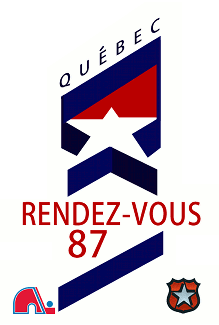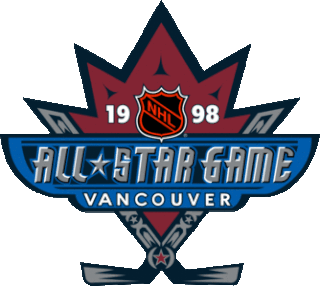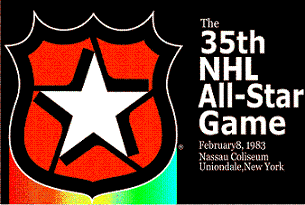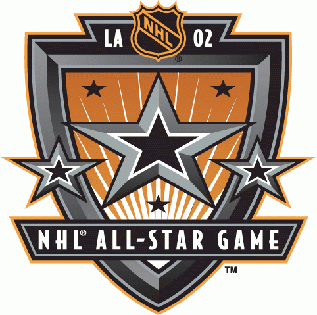
Pavel Vladimirovich Bure is a Russian former professional ice hockey player who played the right wing position. Nicknamed "the Russian Rocket" for his speed, Bure played for 12 seasons in the National Hockey League (NHL) with the Vancouver Canucks, Florida Panthers and New York Rangers between 1991 and 2003. Trained in the Soviet Union, he played three seasons with the Central Red Army team before his NHL career.

Rendez-vous '87 was a two-game international ice hockey series of games between the Soviet Union national ice hockey team and a team of All-Stars from the National Hockey League, held in Quebec City. It replaced the NHL's All-Star festivities for the 1986–87 NHL season. The Soviet team was paid $80,000 for their appearance in Rendez-vous '87, while the NHLers raised $350,000 for the players' pension fund.

The 2003 National Hockey League All-Star Game took place on February 2, 2003 at Office Depot Center in Sunrise, the home of the Florida Panthers. It was the first All-Star Game since the 1997 All-Star Game to use the Eastern Conference–Western Conference format.

The 1991–92 NHL season was the 75th regular season of the National Hockey League. The league expanded to 22 teams with the addition of the expansion San Jose Sharks. For the first time, the Stanley Cup Finals extended into June, with the Pittsburgh Penguins repeating as Stanley Cup champions, winning the best of seven series four games to none against the Chicago Blackhawks.

The 44th National Hockey League All-Star Game was the last NHL All-Star Game to take place at the Montreal Forum on February 6, 1993. Before the start of the Game, there was a tribute to Mario Lemieux, who was in attendance but could not play due to his treatments for Hodgkin's Disease. The Tampa Bay Lightning sent their first representatives to an All-Star Game. Mike Gartner would take Mark Messier's place in the All-Star lineup and ended up becoming the fourth player in All-Star history to score four goals in one game, earning All-Star MVP honours. The final score was Wales Conference 16, Campbell Conference 6.
The 5th National Hockey League All-Star Game took place at Maple Leaf Gardens, home of the Toronto Maple Leafs, on October 9, 1951. Two teams of all-star players played to a 2–2 tie.

The 40th National Hockey League All-Star Game was held at Northlands Coliseum in Edmonton, home to the Edmonton Oilers, on February 7, 1989.

The 1998 National Hockey League All-Star Game took place at General Motors Place in Vancouver, home to the Vancouver Canucks, on January 18, 1998.

The 1999 National Hockey League All-Star Game took place on January 24, 1999, at Ice Palace in Tampa, home to the Tampa Bay Lightning.

The 1996 National Hockey League All-Star Game took place at the FleetCenter in Boston on January 20, 1996. The 46th game was originally scheduled to take place in 1995, but the lockout of the 1994–95 NHL season led to its postponement.

The 35th National Hockey League All-Star Game was held on February 8, 1983, at the Nassau Veterans Memorial Coliseum in Uniondale, New York, home to the New York Islanders. In the game, Edmonton Oilers' centre Wayne Gretzky set an All-Star Game record by scoring all of his four goals in the third period. Gretzky's four goal performance was instrumental in winning his first All-Star M.V.P. honor. Wayne Gretzky's Edmonton Oilers' linemate Mark Messier assisted on three of the four goals in the third period to set an All-Star Game record for most assists in a period.

The 2001 National Hockey League All-Star Game took place on February 4, 2001, at Pepsi Center in Denver, home to the Colorado Avalanche. The final score was North America 14, World 12.

The 2002 National Hockey League All-Star Game took place on February 2, 2002, at the Staples Center in Los Angeles. The final score was World 8, North America 5. This was the last NHL All-Star Game to have the North America vs. World All-Star format. It was also the last All-Star Game that was held in the same year as the Winter Olympics until the 2018 edition, and the last held in the same year as Olympic participation until the 2026 edition.

The 1997 National Hockey League All-Star Game took place on January 18, 1997, at San Jose Arena in San Jose, home of the San Jose Sharks. The final score was Eastern Conference 11, Western Conference 7. This game was originally scheduled for the 1994–95 season, but was cancelled due to the 1994–95 NHL lockout.

The 2004 National Hockey League All-Star Game was held on February 8, 2004, at the Xcel Energy Center in Saint Paul, home of the Minnesota Wild. The Eastern Conference defeated the Western Conference 6–4. This was the final All-Star Game until 2007.

The 43rd National Hockey League All-Star Game was contested at The Spectrum in Philadelphia on 18 January 1992. It featured 16 goals as the Campbell Conference defeated the Wales Conference, 10–6. Brett Hull was named as the All-Star M.V.P. by recording two goals and one assist, while playing on a line with Los Angeles Kings' Wayne Gretzky and Luc Robitaille. This was also the first All-Star Game in which the San Jose Sharks sent a representative.
The 1987–88 Boston Bruins season was the Bruins' 64th season. The season involved participating in the Stanley Cup finals.

The 1994 National Hockey League All-Star Game was held in Madison Square Garden in New York City, home of the New York Rangers, on January 22, 1994.

The 37th National Hockey League All-Star Game was held in the Olympic Saddledome in Calgary, home of the Calgary Flames, on February 12, 1985. The Wales Conference defeated the Campbell Conference 6–4. The game's most valuable player was Mario Lemieux, who became the first rookie to win All-Star MVP honours, a feat that would not be repeated until 33 years later by Vancouver Canuck Brock Boeser in 2018.

The 32nd National Hockey League All-Star Game was held in Joe Louis Arena in Detroit, home to the Detroit Red Wings, on February 5, 1980. The Wales Conference all-star team won for the fifth consecutive time. Reggie Leach was voted MVP after scoring one goal and one assist. This was Wayne Gretzky's first appearance and Gordie Howe's 23rd and final All-Star game appearance.


















